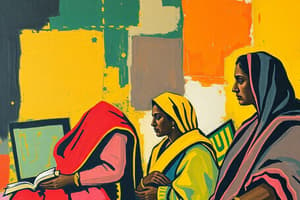Podcast
Questions and Answers
What were some examples of political marginalization of Muslims during the British colonial period?
What were some examples of political marginalization of Muslims during the British colonial period?
Colonial administration disregarded Muslim cultural practices, Muslims were underrepresented in key administration positions, and decisions were made without proper engagement with Muslim leaders.
Why did the majority of Muslims oppose the new educational system introduced by the British?
Why did the majority of Muslims oppose the new educational system introduced by the British?
Because the British preferred Hindus for jobs and Muslims felt politically excluded.
How did the British colonial administration impact Muslims' ability to advocate for their political and social interests?
How did the British colonial administration impact Muslims' ability to advocate for their political and social interests?
Muslims were underrepresented in key positions and decisions were made without proper engagement with Muslim leaders.
How did the British colonial administration exacerbate the feeling of cultural isolation and social alienation among Muslims?
How did the British colonial administration exacerbate the feeling of cultural isolation and social alienation among Muslims?
What was the main reason behind the outrage of Indian Muslims when the all British Simon commission was formed in 1927?
What was the main reason behind the outrage of Indian Muslims when the all British Simon commission was formed in 1927?
What event marked the beginning of the Urdu Hindi controversy in British India?
What event marked the beginning of the Urdu Hindi controversy in British India?
In what ways did the British colonial period lead to communal tensions and violence among different religious groups in India?
In what ways did the British colonial period lead to communal tensions and violence among different religious groups in India?
Why did the Muslims in British India feel the need to maintain their distinctiveness with Hindu civilization?
Why did the Muslims in British India feel the need to maintain their distinctiveness with Hindu civilization?
What principle of Islam was perceived to be violated by the economic and social disadvantages Muslims faced in colonial India?
What principle of Islam was perceived to be violated by the economic and social disadvantages Muslims faced in colonial India?
What was the major driving force behind the demand for a distinct Muslim state in South Asia?
What was the major driving force behind the demand for a distinct Muslim state in South Asia?
Study Notes
Political Marginalization of Muslims
- Muslims faced exclusion from political representation during British rule, leading to diminished influence in governance.
- Policies favored Hindus, consolidating power structures that marginalized Muslim interests in legislative processes.
Opposition to Educational System
- Muslims largely rejected the British educational system due to its perceived promotion of Western values and neglect of Islamic teachings.
- Concerns arose about cultural erosion and loss of religious identity among the Muslim community.
Impact on Advocacy
- The British administration restricted the political engagement of Muslims, limiting their ability to organize and voice their concerns effectively.
- Legal and bureaucratic barriers were established, making it difficult for Muslims to negotiate for equitable rights and policies.
Cultural Isolation and Alienation
- British colonial policies often disregarded Muslim culture, fostering a sense of cultural isolation among Muslims.
- Educational and administrative structures reinforced a social alienation, separating Muslims from the broader Indian society.
Outrage Over Simon Commission
- Muslims reacted strongly against the formation of the Simon Commission in 1927, as it lacked Indian representation, ignoring Muslim voices in political reforms.
- This exclusion was perceived as a continuation of neglect and marginalization by the British.
Urdu Hindi Controversy
- The controversy began with the demand for Hindi as the sole official language, which some Muslims viewed as a threat to Urdu, their cultural identity.
- Tensions escalated as language became a symbol of broader religious and cultural differences.
Communal Tensions and Violence
- British colonial policies emphasized communal divisions, exploiting religious identities to maintain control, leading to increased tensions among Hindus and Muslims.
- Instances of violence and unrest were exacerbated by the socio-political context and divisive policies of the colonial regime.
Need for Distinctiveness
- Muslims felt the need to assert their distinct identity in the face of predominant Hindu civilization to preserve their religious and cultural traditions.
- There was a growing concern over the assimilation pressures from the Hindu majority.
Violation of Islamic Principles
- Economic and social disadvantages experienced by Muslims during colonial rule were seen as violations of Islamic principles of justice and equality.
- The disparity challenged the Muslim community's sense of dignity and socio-economic rights.
Demand for Distinct Muslim State
- The major driving force for the demand for Pakistan was the fear of losing cultural and political identity in a Hindu-majority India.
- The call for a separate Muslim state was rooted in concerns for safeguarding political, social, and cultural rights distinct from Hindu aspirations.
Studying That Suits You
Use AI to generate personalized quizzes and flashcards to suit your learning preferences.
Description
Learn about the political marginalization of Muslims in British colonial India, focusing on how Muslims were sidelined and culturally misunderstood. Explore examples of how their representation in key administration positions decreased during this period.




